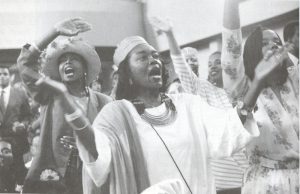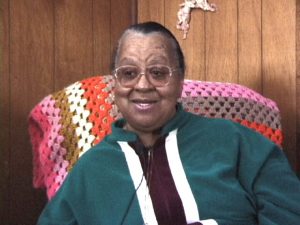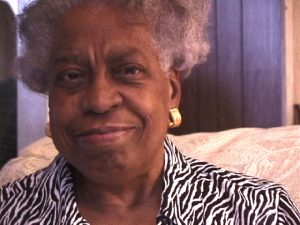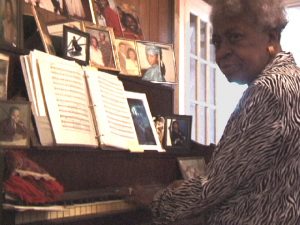
Women in Church: Photo courtesy of African American Almanac.
Music is very important to some people in the African American community. Singing for God and preaching to the melodic chords of an organ are primary elements of church worship. The celebration on Sundays is about singing to God. Within the church setting, many women are consoled by the act of making music. Narrators from the Steelton community articulate how music has played an influential role in their personal and spiritual lives.
Barbara Jeane Baker’s favorite song to sing is Reverend Jeremiah Wright’s “I Won’t Complain.” This song encapsulates the emotions Baker has felt about her life over the years. However, the beauty of this song is that everyone can relate to its lyrics by filling in their own story. Baker does have her good days, but also accepts the bad knowing there’s a greater good around the corner. Baker not only feels tied to this song for it’s message, she also feels moved by the music that allows her to use the gift God has given her, a beautiful voice. Singing with passion, Baker tries to give everything she would to God back to her listeners.
“I’ve had some good days.
I’ve had some hills to climb.
I have some weary days,
And lonely nights.
But when I look around,
And when I think things over,
All of my good days,
Outweigh my bad days,
So I won’t complain.”
Steelton resident, Eleanor Anne Wallace, recalls many fond memories of music. It has been an important aspect of her childhood and has carried over into her adulthood. The majority of her singing takes place in church, as well as in her work with the steel mill unions. Wallace, like Baker, calls upon her singing ability as a gift from God. Although she reveals that she is “not an emotional person,” music has been a place of comfort after a loss. One day in Sunday service, Wallace sang the song “I’m Pressing On,” a favorite of her Reverend friend who had recently passed away. As she sang, she felt herself well up inside, although no tears showed. After the service she got many compliments on how she “really sang that song.” Through music, Wallace was able to mourn the loss of her good friend. As a powerful outlet, Wallace utilizes music spiritually. It helps her express what she often cannot with just plain words.
Eleanor Wallace sings “I’m Pressing On.”
Music not only has the ability to allow spiritual mourning, but it can also give a sense of hope to those who feel like the world has shut them out. Thelma Wright, a Mother of the Prison Ministries, encourages music in the Dauphin County Prison worship study. Wright’s worship study is an unconventional church service because of its location in the prison gymnasium and the congregations being composed of female prison inmates. However, Wright tries to keep the worship study as conventional as possible including songs of hope such as, “What a Fellowship,” “I believe I Can Fly,” and “Amazing Grace.” Through these songs Wright aims to spiritually move the inmates, giving them hope that they are somebody and that God loves them.
To these prison inmates, the worship study is a source of hope they have in their daily lives. Through music, they can feel the love of God as well as allow themselves to express their spirituality. All three of these representations demonstrate how music is influential in many women’s lives throughout the week, and especially on Sundays. These narrators are living history of how music has played an integral part in the Sunday celebration.


